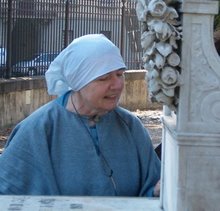That was what this morning was like. People become members of our library by giving it a book. Instead, often, whole libraries are given. In one such collective gift I found a tattered photocopy of a Victorian guidebook to the Torrigiani Garden in Florence. Now Elizabeth Barrett Browning would visit that garden, and so would Frederic Leighton. Isa Blagden and Frederic Tennyson, the Poet Laureate's brother, actually stayed there. And it was there Elizabeth saw the statue of the pagan god Pan with his panpipes, amidst bamboo cane, that became the figure in one of her last poems, 'A Musical Instrument', and that Leighton engraved for its publication in The Cornhill Magazine. Greeks called this game played by poets and artists with each others' media, ecphrasis. Here we combine music, art, poetry.


And there I was, in a very ecphratic moment, reading to Dottor Vieri Torrigiani Malaspina, the first verse of her poem about his family's statue of Pan in their presence:
What was he doing, the great god Pan,
Down in the reeds by the river?
Spreading ruin and scattering ban,
Splashing and paddling with hoofs of a goat,
And breaking the golden lilies afloat
With the dragon-fly on the river.
He tore out a reed, the great god Pan,
From the deep cool bed of the river:
The limpid water turbidly ran,
And the broken lilies a-dying lay,
And the dragon-fly had fled away,
Ere he brought it out from the river.
High on the shore sat the great god Pan
While turbidly flowed the river;
And hacked and hewed as a great god can,
With his hard bleak steel at the patient reed,
Till there was not a sign of the leaf indeed
To prove it fresh from the river.
He cut it short, did the great god Pan,
(How tall it stood in the river!)
Then drew the pith, like the heart of man
Steadily from the outside ring,
And notched the poor dry empty thing
In holes, as he sat by the river.
. . .
Yet half a beast is the great god Pan,
To laugh as he sits by the river,
Making a poet out of a man:
The true gods sigh for the cost and pain, -
For the reed which grows nevermore again
As a reed with the reeds in the river.
Great excitement. I went straight from the Garden, shown me by Doctor Torrigiani Malaspina, to the Museo Archeologico and to the Sovrintendenza Archeologica Toscana to tell them of this garden, filled with statues of Isis, sphinxes, an Egyptian tomb, and a hermitage where a plaque told us 'Mary Anne Chichester' had lived, who is buried here in a fine classical tomb. And realized while cycling down Florentine streets that the two profile faces on Lord Leighton's classical harp on EBB's tomb are the two sides of the god Pan's face in the Torrigiani garden, rather than of Tragedy and Comedy as I had formerly thought. For he had made that fine engraving for her poem that last year of her life, then designed her tomb. And hidden among the three harps, Greek, Hebrew, Christian, also the god Pan with one side of his face distorted, from playing panpipes, the other serene.


For more on Elizabeth Barrett Browning and Lord Leighton see http://www.florin.ms/ebbdeath.html
The United Nations Society of Writers described their celebration of EBB: 'On Friday, 27 January 2006, UNSW held its 10th annual salon. 67 Poets and essayists from the United Nations Office in Geneva, some of them members of PEN International read their oeuvres in English, French, German, Spanish, Russian -- even Arabic, Vietnamese and Dutch. We celebrated the centennial of the birth of Samuel Beckett and the bicentennial of the birth of Elizabeth Barrett Browning, whose "Sonnets from the Portuguese" seduced not just her husband Robert Browning!'
And from Japan: 2006 年3月号 CDオープニング・ナレーション(track 1)Hello, everyone. To begin, as always, we'd like to thank you for purchasing this issue of CNN English Express. For our celebrity born in the month of March, we go a bit back in history to shed some light on the life of one of the English-speaking world's most celebrated poets, Elizabeth Barrett Browning. Famed above all for penning the immortal lines, "How do I love thee? Let me count the ways," Elizabeth was born in England on March 6, 1806. So this year marks the bicentennial anniversary of her birth. She developed an interest in poetry as a young girl, and by the age of 12, she was already composing her first epic poem. But more about Elizabeth Barrett Browning in a little while. First, it's time for us to get started on this month's lesson.
shed light on: ~を照らす、~に光をあてる/celebrated: 有名な、著名な/poet: 詩人/(be)famed for: ~で有名である/above all: とりわけ、何よりも/pen: ~をペンで書く/immortal: 不朽の、不滅の/lines: 詩/thee: ≪古語≫ なんじを/count: ~を数える/mark: ~を祝う、記念する/bicentennial: 二百年記念の/anniversary: 記念日/develop an interest in: ~に興味を持つ/compose: (小説・詩などを)書く/epic poem: 叙事詩/in a little while: まもなく、すぐ
We are now at 1210 signatures on the web at http://www.thepetitionsite.com/takeaction/471134975,
'That the Swiss-owned, so-called 'English' Cemetery in Florence be kept open, be restored and be declared a UNESCO World Heritage Site', and with 1238 signatures in-house from our visitors, for a total of 2448 signatures. We have decided to keep them coming.
If you wish to donate to the Aureo Anello Association for the restoration of the 'English' Cemetery you can do so by a cheque made out to 'Aureo Anello' and posted to 'English' Cemetery, Piazzale Donatello 38, 50132 Florence, Italy; or through the Pay Pal 'Donate' button below, which can also be used for the CDs, hand-bound limited edition books and sculptures of Elizabeth and Robert's 'Clasped Hands':

Sincerely,
Julia Bolton Holloway
Aureo Anello Association for the Library and Cemetery
Piazzale Donatello, 38
50132 FIRENZE, ITALY



